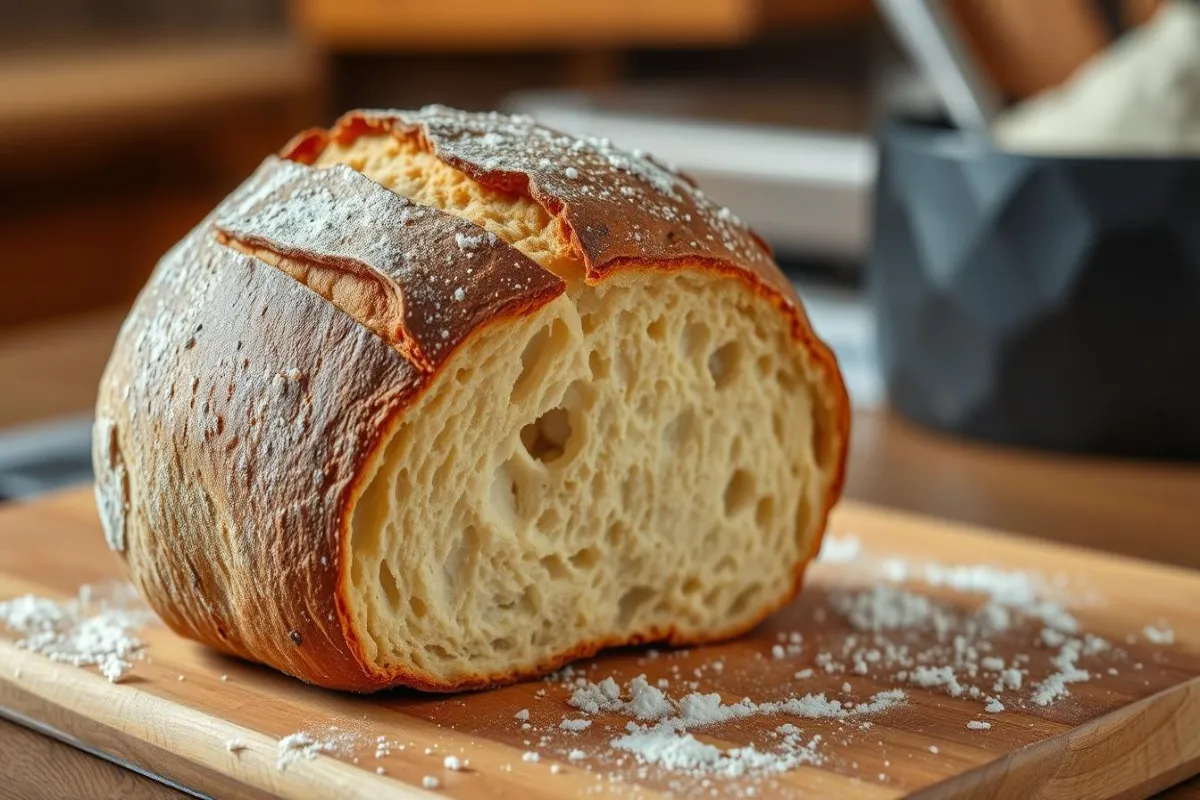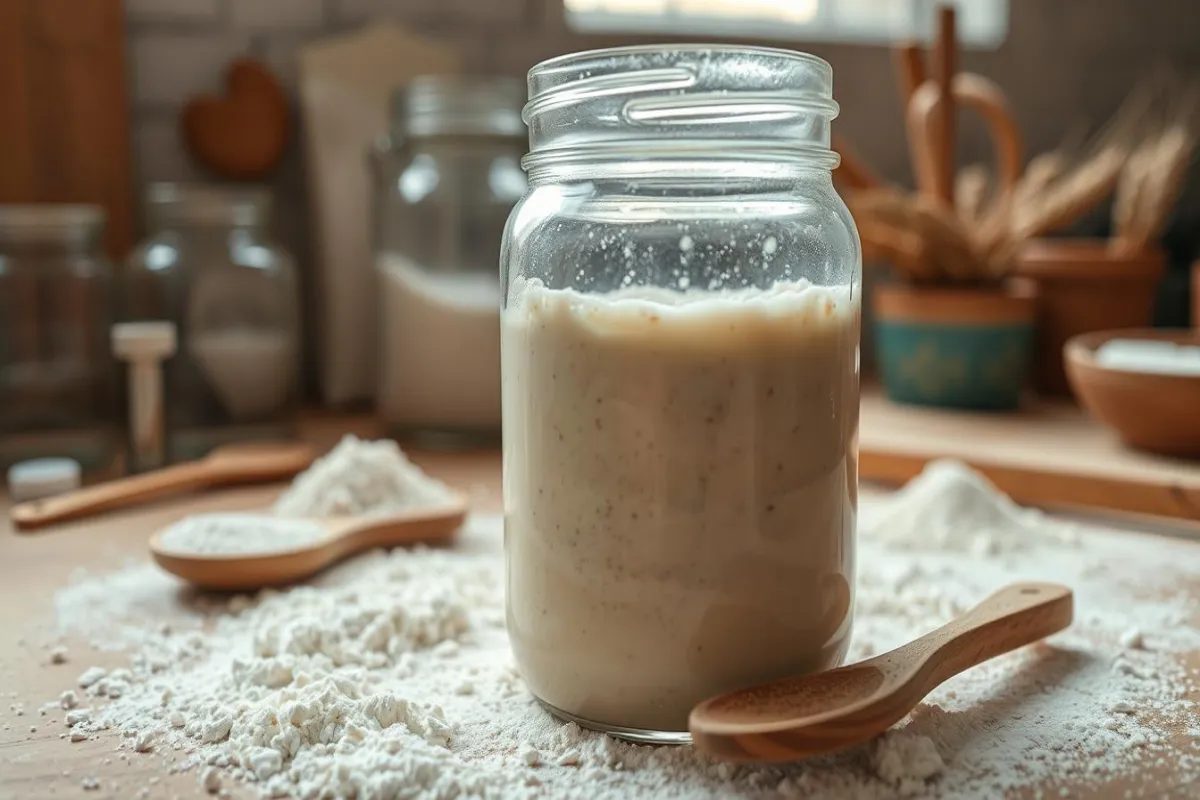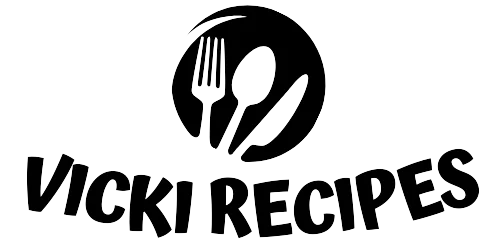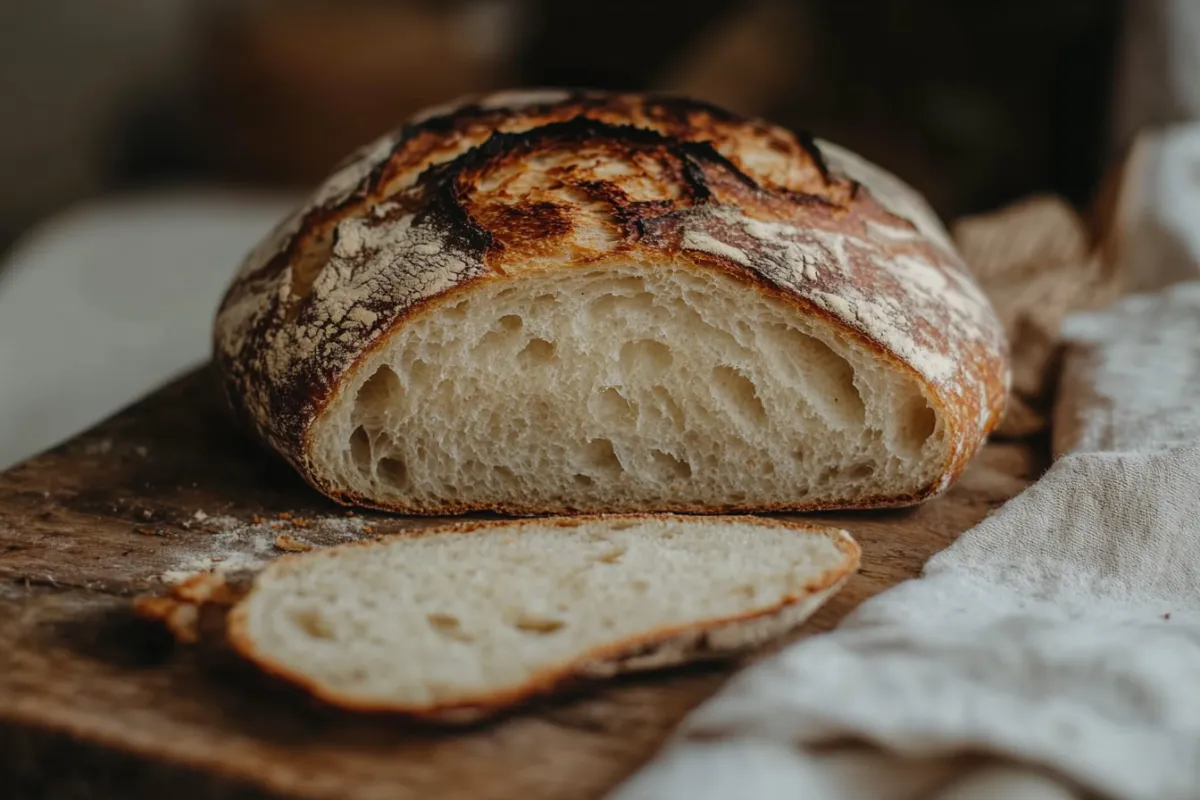I’ve always been interested in health and nutrition. The debate about gluten-free diets caught my attention. I wondered if sourdough bread, a favorite in artisanal bakeries, could be gluten-free. Let’s look into sourdough bread and its gluten connection, including the fermentation process, ingredients, and health benefits for those with gluten issues.

Sourdough bread is gaining fans for its taste and health perks. But, is it really gluten-free? To answer this, we need to understand gluten and its effects on diets.
Understanding Gluten
Gluten is a protein found in grains like wheat, barley, and rye. It makes baked goods elastic and chewy. But for those with celiac disease or gluten sensitivity, gluten can cause a lot of trouble.
What is Gluten?
Gluten is made of two proteins: gliadin and glutenin. These proteins are in many grains. They make bread and baked goods springy and chewy. But for some, gluten is a big problem.
Gluten and Celiac Disease
Celiac disease is an autoimmune disorder. It happens when the body attacks the small intestine because of gluten. This can cause inflammation, damage, and symptoms like pain, bloating, and diarrhea. People with celiac disease must avoid gluten to stay healthy.
Some people have gluten sensitivity. They react badly to gluten but don’t have an autoimmune response. The exact cause of gluten sensitivity is still a mystery. But it’s a big concern for those looking to improve their diet.
| Condition | Description | Treatment |
|---|---|---|
| Celiac Disease | An autoimmune disorder where the body attacks the small intestine when gluten is consumed. | Strict gluten-free diet |
| Gluten Sensitivity | A condition where individuals experience adverse reactions to gluten without an autoimmune response. | Gluten-free or low-gluten diet |
It’s important to understand gluten and its effects on health. This knowledge helps people make better food choices and stay healthy.
The Sourdough Fermentation Process
The art of making sourdough bread is all about the sourdough fermentation process. This method has been passed down for generations. It’s what makes sourdough bread so special.
The sourdough culture is at the core of sourdough making. It’s a mix of wild yeast and good bacteria. This culture is carefully looked after, making the bread-making process possible.
The traditional baking ways are key in making sourdough. The slow fermentation lets the culture work its magic. This turns the dough into a work of art, a true artisan bread.
The bread-making process is a dance between the culture, the dough, and time. It creates a unique mix of flavors and textures. The end result is a loaf that’s both fulfilling and a tribute to sourdough‘s rich history.

“The sourdough fermentation process is a dance between the culture, the dough, and the patience of the baker – a delicate balance that produces bread that is truly one-of-a-kind.”
Is Sourdough Bread Gluten Free?
Sourdough bread is known for its unique taste and health perks. But, many wonder if it’s gluten-free. Let’s look at what’s in sourdough bread and how making it affects gluten levels.
Ingredients in Sourdough Bread
Traditional sourdough bread mainly has flour, water, and a sourdough starter. The starter has wild yeast and lactic acid bacteria. These are key for the bread’s fermentation. Unlike other breads, sourdough doesn’t have commercial yeast added.
The flour in sourdough is usually wheat. Wheat has gluten, a protein that makes dough elastic. So, regular sourdough bread isn’t gluten-free.
Gluten Content in Sourdough
Even though sourdough isn’t free of gluten, the making process can change gluten levels. The enzymes in the starter break down gluten proteins during fermentation. This might make the bread easier to digest for those with gluten issues or celiac disease.
But, how much gluten is broken down can differ. It depends on the fermentation time, flour type, and starter. Remember, sourdough isn’t for strict gluten-free diets.

“The fermentation process in sourdough bread can help break down some of the gluten, but it does not make the bread entirely gluten-free.”
Gluten-Free Bread Alternatives
For people with dietary restrictions like celiac disease or gluten sensitivity, finding bread can be hard. But, there are many free of gluten flours available. These flours help those on special diets enjoy tasty and healthy bread.
Gluten-Free Flours
There are many gluten-free flours, each with its own benefits. Here are some popular ones:
- Almond flour: Made from almonds, it’s rich in protein and healthy fats. It’s a great wheat substitute.
- Coconut flour: Ground from dried coconut, it’s low in carbs and high in fiber. It’s good for low-carb diets.
- Rice flour: Ground from rice, it’s versatile and can be used in many gluten-free baked goods.
- Sorghum flour: From an ancient grain, it’s full of vitamins, minerals, and antioxidants. It’s a healthy wheat alternative.
| Gluten-Free Flour | Key Nutritional Benefits |
|---|---|
| Almond Flour | High in protein, healthy fats, and fiber |
| Coconut Flour | Low in carbs, high in fiber |
| Rice Flour | Versatile, mild flavor |
| Sorghum Flour | Nutrient-dense, high in antioxidants |
These gluten-free flours can be used alone or mixed to make many tasty bread options. They meet the needs of those with dietary restrictions.
Nutritional Benefits of Sourdough
I love bread and the special nutrients in sourdough bread. Unlike regular bread, sourdough’s fermentation process changes its nutrients. This makes them better for our bodies.
Sourdough is great because it’s easy to digest. The slow fermentation breaks down gluten. This makes it easier for our bodies to get the vitamins, minerals, and antioxidants from the bread. It’s especially good for people with gluten issues.
| Nutrient | Sourdough Bread | Conventional Bread |
|---|---|---|
| Folate | 26% increase | No significant change |
| Iron | 28% increase | No significant change |
| Magnesium | 20% increase | No significant change |
The fermentation also makes nutrients like folate, iron, and magnesium more available. This means our bodies can use these vitamins and minerals better when we eat sourdough.
Adding sourdough to your diet is a smart choice for healthy eating. It brings the benefits of artisan bread and traditional baking to your meals. Enjoy the health perks that sourdough offers.
Sourdough and Celiac Disease
For those with celiac disease or gluten sensitivity, finding safe bread options can be tough. But, sourdough bread might offer a solution. Its unique fermentation process could make it easier to digest.
Digestibility of Sourdough
The way sourdough is made changes gluten’s digestibility. Lactobacilli and yeasts break down gluten proteins during fermentation. This makes gluten easier to digest, helping those with celiac disease or gluten sensitivity.
Research shows sourdough can have up to 100% less gluten than regular bread. This makes it a good choice for those on special diets. The slow rise of sourdough also helps break down gluten further.
“The sourdough fermentation process is a game-changer for individuals with celiac disease or gluten sensitivity. The reduced gluten content and improved digestibility make sourdough a promising alternative to traditional wheat-based breads.”
But, the gluten in sourdough can still vary. People with severe celiac disease or gluten sensitivity should talk to their doctor before trying sourdough.
Artisan Sourdough Bakeries
Artisan sourdough bakeries are key in keeping traditional bread-making alive. They carefully tend to their sourdough starters. This creates bread that’s not just tasty but also a symbol of a long-standing tradition.
These bakeries deeply respect sourdough culture and traditional baking techniques. They take pride in their artisan bread bakery. They focus on every detail, from mixing the dough to baking and presenting the loaves.
What makes these bakeries special is their use of natural leavening from sourdough starters. This slow process improves the bread’s flavor and texture. It also makes each loaf unique.
| Artisan Sourdough Bakery | Unique Baking Techniques | Signature Sourdough Offerings |
|---|---|---|
| Acme Bread Company | Hand-shaping, long fermentation, wood-fired ovens | Country Loaf, Whole Wheat Sourdough, Rye Sourdough |
| Boudin Bakery | Starter dating back to 1849, slow proofing, steam injection | Sourdough Boules, Sourdough Baguettes, Sourdough Rolls |
| Tartine Bakery | Organic flours, long bulk fermentation, oven-spring technique | Country Bread, Whole Wheat Sourdough, Seeded Sourdough |
These bakeries not only make amazing breads. They also teach and inspire others about the traditional bread-making process. They help people see the beauty and science behind sourdough.
“Sourdough is a living, breathing thing, and it’s the heart and soul of our bakery.”
Traditional Bread-Making Processes
The art of making bread has been passed down for generations. At its core is the sourdough starter. This starter adds a special flavor and is key to the bread-making journey.
Sourdough Starter Recipe
Starting a sourdough starter from scratch is a rewarding journey. It takes patience and dedication. You’ll need flour, water, and time to begin.
- In a clean jar, mix equal parts of whole wheat or rye flour and water. Stir until it’s smooth and pourable.
- Cover the jar loosely and let it sit at room temperature for 24 hours.
- After 24 hours, throw away half of the mixture. Add the same amount of fresh flour and water. Do this daily for 5-7 days, until it’s bubbly and active.
- When your starter is ready, feed it regularly with flour and water. Store it in the fridge when not using.
This traditional sourdough starter is the base for artisan bread. It gives bread a complex flavor and chewy texture. By following traditional bread-making processes, you can bring out the best in your sourdough.
“Sourdough bread is the result of a patient and deliberate fermentation process, which is what gives it its unique character and flavor.”
Specialty Diets and Sourdough
I’m really interested in how sourdough helps with specialty diets, especially for those with gluten sensitivity. Many people, with or without celiac disease, find relief in no gluten diets. They look for better health and comfort.
Gluten Sensitivity
Gluten sensitivity is becoming more common, causing symptoms like stomach pain and headaches. It makes finding safe bread and baked goods hard. But, sourdough’s unique fermentation might be a good answer for some.
Research shows that sourdough’s lactobacteria and enzymes can break down gluten. This could help those with gluten sensitivities. It means more bread options for people on free of gluten diets or with other dietary needs.
FAQ
Is sourdough bread free of gluten?
No, traditional sourdough bread is not celiac safe. It’s made from wheat flour, which has gluten. The fermentation process can break down some gluten, but it doesn’t remove all of it.
What are the ingredients in sourdough bread?
Sourdough bread is made from wheat flour, water, and a sourdough starter. The starter is a mix of flour and water that’s fermented. This gives sourdough its unique taste and texture.
How much gluten is in sourdough bread?
The gluten in sourdough bread varies by recipe and fermentation. While fermentation breaks down some gluten, it’s still a lot. This makes sourdough unsuitable for those with celiac disease or severe gluten sensitivity.
What are some no gluten bread alternatives?
Gluten-free bread alternatives include flours like almond, coconut, or no gluten all-purpose blends. These are good for those on a no gluten diet.
What are the nutritional benefits of sourdough bread?
Sourdough bread has nutritional benefits over traditional wheat bread. Fermentation boosts the bioavailability of nutrients like B vitamins and minerals. It may also be easier to digest for some due to gluten breakdown.
Can individuals with celiac disease eat sourdough bread?
No, those with celiac disease should avoid sourdough bread. It contains gluten, which can cause an autoimmune reaction. A strict celiac safe diet is necessary for celiac disease, and sourdough is not suitable.
How can I make a no gluten sourdough starter?
To make a no gluten starter, use flours like brown rice, millet, or celicac safe blends. The fermentation process is similar to traditional sourdough. This allows for no gluten sourdough bread.
How do specialty diets impact the consumption of sourdough bread?
For those on a celiac safe diet, like those with celiac disease or gluten sensitivity, sourdough is not an option. But for those without dietary restrictions, it can be part of a healthy diet in moderation.

